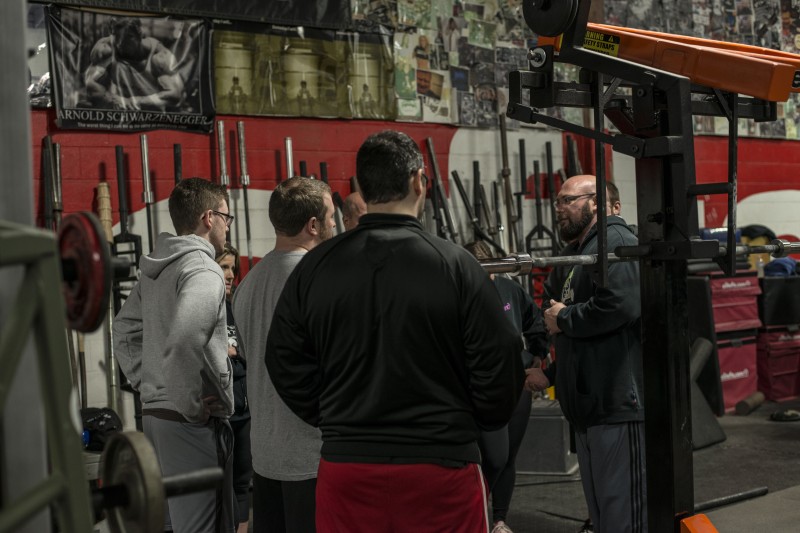
Over the past few years, we've had several people stay with us for an extended period of time, including Eastern Europeans, my main man JT (who went to the same high school as Matt Goodwin of elitefts™), and my assistants. We don't live in a large house, and we don't have air conditioning, but we have enough and are determined to share what we do have with those around us. The perks of having people stay with you is that sometimes they like you and they send you cool stuff. For instance, one of our former housemates bought me a bottomless growler of beer for Christmas. Basically, once a week, this young lady comes to my house, takes my growler, fills it with the sweet nectar of life and returns said growler to my refrigerator. One of our other housemates was able to make a few trips to London, Ohio, with us and will never let me forget the time he and Jim Wendler discussed race relations over coffee (even though Jim was convinced that it wasn't coffee). I'm sure you're asking, what does this have to do with communicating your vision? Everything!
How many books are written about leadership and vision? This is a trick question because there are so many, it's now white noise. It's like listening to Beyonce. Yes, you may be inspired right now, but you'll forget about it soon enough and will probably never want to go back (I think Beyonce has an amazing voice, by the way, but terrible music). I've read many books about leadership with fervor and I've made notes in the margins, but there are others that just rehash what has already been said a million times.
RECENT: My Weekend of Strength
Last night, I started discussing one of these books with a former housemate of ours. I felt that what was missing was a tie between physiology and psychology. Amy Cuddy discussed some of this in her TED talk and the book about her TED talk titled Presence. I think it was a good start for where psychology and physiology meet, but it just scratches the surface. The future of leadership needs to address how the body reacts to all stressors and how we can use this to our advantage.
This conversation then led to my wife telling us about how a department where she works went to an open floor plan. She works for a company with over 38,000 employees, and the department with the open floor plan consisted of programmers. I thought that this was an interesting decision because programmers aren't generally social butterflies. All the people I know who do this type of work just want to sit and do their work alone at their computer undisturbed. I asked my wife if the company had explained the vision behind this move. She wasn't sure whether or not the vision had been explained, but it sounded to me like a company that had seen what Google was doing and said, "Let's try to do that."
Google tends to be a linchpin in the debate as to how to sell your vision. Last summer, I read one book that advocated for work cultures like Google's, and I followed it up with a book that was very much against Google's culture. Reading both sides back to back was interesting. The one book argued that Google lets its employees ride the bus for free to save them money and time while the other book argued that Google was taking advantage of free labor by putting employees on a company bus with company Wi-Fi so that they could do more work for the benefit of Google, not the employees. Google offers free concerts. Is that to give employees a break or to keep them at work longer?
As I see it, it all comes down to this—is Google creating a safe, happy working environment or is Google creating new company towns like the steel mills did here in western Pennsylvania 100 years ago? I don't have the answer, but I do know that Google gets many people on board with its vision. I wrote an article a few years ago about why being rated a five on a scale of zero to 10 can be better than being rated a 7.5. Google has done a great job at this. They have people who love their vision and others who loathe their vision. So what is your vision and how would people rate it?
I've made some of my best friends at work—coaches, trainers, former athletes and even an administrator or two. At the same time, I've dealt with people who don't like me at all (I like to think there are more of the former), and I've learned not to let this bother me. Mark Watts has written extensively on not trying to please everyone. I've learned this the hard way many times. Trying to please others isn't being true to you or to your vision. Many people won't want to take that trip with you to your goals and that's just fine. Often, people use this as an excuse to be impolite. While you shouldn't try to please everyone, you also shouldn't be rude and say, "I'm just being me." I once heard a coach tell her team, "As a female, to get things done, you must be a b*****." I couldn't disagree more. You should be you. You shouldn't be a loser.
Sell Your Vision
Do you know what you're selling? Google knows that they're selling the vision of the best place to work in the world. I know I'm selling to my athletes that they will use all I teach them to improve all aspects of their lives. I also know I'm selling to my staff that they will be better if they follow my lead. I know I'm selling a vision of being the best strength and conditioning department that we can be to my administration. This all sounds really cool, but I hope that everyone sees one glaring weakness. There isn't anything quantifiable in any of this.
So how can you sell your vision when it's difficult to score your vision? Start with goals! For my athletes, this is easy. Did their strength increase? For my staff, this is still pretty straight forward. Are they leaving me for better opportunities and making the most of those opportunities? The hardest one for me to deal with is the administration. What does success and your vision look like to them? Mark Watts has mentioned many times how hard it is grade a strength coach. I don't know what success or my vision looks like to my administration. I take solace in the fact that many of my administrators are friends of mine and they tell me that they respect what we do at work. This still doesn't answer the question. One tactic we use here is we try to communicate our vision to our administration. Think back to Amy Cuddy's TED talk. If we can change our lives, we can change our chemistry, which helps change our lives. So if we empower our administrators, do we not empower ourselves? This is what we're working on doing now at my university. We're attempting to not only share and sell our vision but empower others to participate in that vision.
RELATED: Two Factors that are Killing your Team
This is where it gets hard. Ask yourself, what is your vision? People struggle with this one. Most say, "I want to be the best." Do you really? Are you really willing to do what the best have done? JL Holdsworth, Dave Tate and many other lifters moved to Columbus, Ohio, to train. What jobs did they have? I'll just say that I've been sworn to secrecy. The point is be honest with yourself. My previous track coach never wanted to deal with strength and conditioning. A new coach was hired, and I offered to work with the team if she wanted me to. She agreed. My first semester has gone well, and I haven't worried about performance enhancement. I have only worried about building relationships and selling my vision. I want my department to outperform all others at my school. I want my students to speak highly about us on exit interviews, and I want them to know that we care. That's pretty much it. If I get this done, we have been successful.
So what do you want and what are you willing to do to get it? Now that you have your vision, share it loudly. Have a meeting, set some standards and set some goals to get there. Ten years ago, I started hosting a conference. This was one of my goals to learn from the best. Since that first conference, I've hosted four others and it has been as successful as I could have ever wanted. Now I let staff members take over the planning so that they can get the experience and make new connections. This is just one of our goals that everyone who works for me should know about.
Don't be relentless about that vision. Be a human about it and know that if things get off track, it's OK. Bring it back to where you want it. Don't kill yourself over missteps. Today, I was speaking with the football team about former athletes and how a few of them don't like me (how can that be?). This is OK. You won't get everyone on board. I'm proud to say that the successful ones tend to be on board and that is what matters.
I hope some of this got your wheels turning about your own vision and how you can sell it without being like some of the bad examples I used. I honestly don't know if I do the right thing or the wrong thing every day at work, but I'll continue to do whatever it is I'm doing until someone takes my keys. I really hope it's the right thing. No, it is the right thing.











